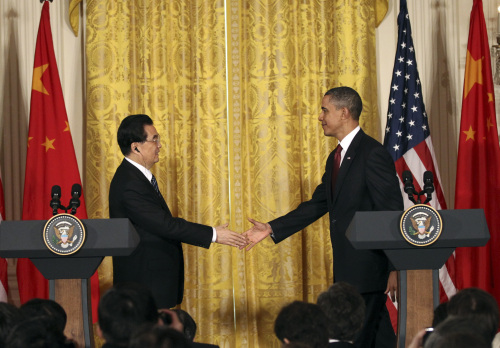South Korea appreciates the outcome of the U.S.-China summit, an official said Thursday, after the high-stakes meeting called for inter-Korean dialogue as an "essential step" in reducing tensions and expressed "concern" about North Korea's uranium enrichment program.
U.S. President Barack Obama and Chinese President Hu Jintao held a summit in Washington on Wednesday (U.S. time) that touched on a wide range of issues, including heightened tensions on the Korean Peninsula over Pyongyang's military provocations and nuclear programs.
The joint statement issued after the meeting said that the two leaders "emphasized importance of an improvement in North-South relations and agreed that sincere and constructive inter-Korean dialogue is an essential step," a stance that is in line with the South's position.
 |
Chinese President Hu Jintao(L) shakes hands with U.S. President Barack Obama at a joint press conference at the White House in Washington, the United States, Jan. 19, 2011. (Xinhua-Yonhap News) |
Obama and Hu also "expressed concern regarding the DPRK's claimed uranium enrichment program," according to the statement that referred to the North by the acronym of its official name, Democratic People's Republic of Korea.
China's agreement to voice concern about the uranium program represents a step forward because Beijing has so far been reluctant to even acknowledge the program's existence despite Pyongyang's claims to it.
"It appears things turned out well. We appreciate its outcome," a South Korean foreign ministry official said on condition of anonymity. "What is more important is to follow up on the outcome.
We expect that China will play a role as a responsible country in the region."
Washington plans to send an envoy to Seoul "as early as next week" to debrief the Asian ally on the results of the summit, the official said. Either Deputy Secretary of State James Steinberg or Assistant Secretary of State Kurt Campbell is expected to come, officials have said.
Tension on the Korean Peninsula spiked in November last year after North Korea shelled the South's border island of Yeonpyeong, killing four people, including two civilians, and revealed that the regime is running a uranium enrichment facility.
Uranium, if highly enriched, can be weapons-grade, giving Pyongyang a second way of building nuclear weapons after its existing program based on plutonium, with which the communist nation conducted two nuclear test explosions in 2006 and 2009.
North Korea has since made an abrupt about-face, stepping up peace overtures and calling for unconditional talks with the South, a move that fits the typical pattern of Pyongyang's behavior of raising tensions with provocations and then calling for dialogue to extract concessions.
In response, South Korea and the U.S. have said that Pyongyang should first improve relations with Seoul by taking responsibility for the island shelling as well as the March sinking of a South Korean warship, and demonstrate its denuclearization commitment through action.
In particular, Seoul and Washington have called for a tougher international response to the North's uranium enrichment program, saying it violates U.N. Security Council resolutions and Pyongyang's own 2005 commitment to give up nuclear programs in exchange for concessions.
China, the last-remaining major ally and main aid provider for the impoverished North, has been considered an impediment to efforts to get the Council to take up the matter. Beijing had remained vague on the program, saying the program must first be verified.
Given such a Chinese position, Wednesday's summit could be considered a success and brighten the prospects of the Council taking up the agenda for punishment of the North.
But the South Korean official cautioned against hasty optimism, saying that expressing concern is one thing and how to deal with it is another.
"We should hear more about how the two sides agreed to deal with it," he said. "In light of the Chinese stance so far, chances of its agreement (to any Council action) are not high."
(Yonhap News)
<한글 기사>
정부, 미.중 정상회담 `北문제 논의' 긍정평가
당국자 "中, 공동성명에서 UEP 우려표명 의미있어"
"한.미공조에서 벗어나지 않아..北 태도변화 관건"
정부는 20일 버락 오바마 미국 대통령과 후진타오(胡錦濤) 중국 국가주석간 정상회담의 북한 문제에 대한 협의 결과에 대해 긍정적이라는 반응을 보였다.
정부 당국자들은 미.중 정상회담 직후 발표된 공동성명에 북한 문제에 대한 한 국과 미국의 입장이 적지 않게 반영돼 있다고 평가했고, 특히 북한의 우라늄농축 프로그램(UEP) 문제에 대한 우려가 공동성명에 포함된 점에 의미를 부여했다.
정부 당국자는 "새로운 성과가 있었다고 보기는 힘들지만 그동안 유지해온 한.미 공조의 라인을 벗어나지 않았다는 점에서 긍정적"이라며 "UEP 문제에 대해 중국 이 공동성명으로 우려를 표명하고 UEP가 간접적으로나마 9.19 공동성명에 위배되고 국제규범에 합치되지 않는다는 점을 규정한 것은 의미가 있다"고 말했다.
다른 당국자도 "우라늄농축에 대한 중국의 입장이 구체적으로 나온 점이 눈에 띈다"며 "중국이 북한의 우라늄농축에 대해 우려를 표시하고 반대 입장을 낸 것으로 본다. 지금까지 중국의 입장 중에 가장 앞서 있다"고 말했다.
이와 함께 정부는 이번 공동성명이 남북대화와 6자회담 재개로 이어지기 위한 필수적 조치를 강조한 점도 긍정적으로 보고 있다.
한 당국자는 "남북관계가 필수적인 조치라고 언급한 것은 6자회담 재개에 앞서 남북대화가 선행돼야 한다는 관련국들의 입장을 반영한 것"이라며 "6자회담의 조기 재개도 포함됐지만 이를 위한 필수조치를 촉구함으로써 사전 정지작업 및 여건조성을 강조하고 있다"고 말했다.
그러나 공동성명에 북한의 도발을 규탄하는 표현이 명시적으로 들어가지 않은 것은 아쉬운 대목이다.
다만 정부는 오바마 대통령이 공동 기자회견에서 "우리는 북한이 추가도발을 하 지 말아야 한다는 데 합의했다"고 언급했다는 점에서 미진한 부분이 보완된 것으로 해석했다.
정부는 남북대화 및 6자회담 재개 전망과 관련해서는 북한이 먼저 진정성 있는 태도를 보여야 한다는 기존 입장을 재확인했다.
정부 당국자는 "앞으로 북한이 어떻게 진정성 있는 태도 변화를 보이느냐가 관건"이라며 "지금 상황이 어려운데 서로 해법을 모색해야 한다"고 강조했다.
이와 관련해 정부는 이달 말 방한할 가능성이 높은 제임스 스타인버그 국무부 부장관 등 미국 고위급 인사로부터 미.중 정상회담에 대한 상세한 설명을 듣고 UEP 문제를 비롯한 북한 문제의 대응방안을 논의할 예정이다.
한편 정부는 최근 외교채널을 통해 미국과 24시간 협의체제를 유지하면서 미.중 정상간 공동성명에 우리측 입장이 반영되도록 노력해온 것으로 알려졌다.
특히 외교부 내 한반도평화교섭본부가 주한 미국대사관측과 수시로 접촉, 공동 성명에 UEP 문제 등이 포함돼야 한다고 설명하고 한덕수 주미대사도 워싱턴에서 미국 고위인사들을 만나 정부 입장을 적극 전달했다는 후문이다.
(연합뉴스)








![[Today’s K-pop] Blackpink’s Jennie, Lisa invited to Coachella as solo acts](http://res.heraldm.com/phpwas/restmb_idxmake.php?idx=644&simg=/content/image/2024/11/21/20241121050099_0.jpg)